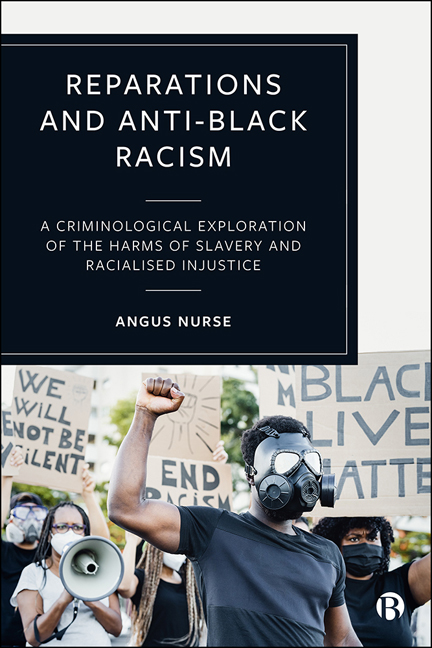 Reparations and Anti-Black Racism
Reparations and Anti-Black Racism Book contents
- Frontmatter
- Contents
- List of Abbreviations
- Acknowledgements
- Preface
- 1 Black Lives Matter: The Legacy of Slavery
- 2 Slavery and Reparations: A Criminological View
- 3 Reparations Litigation: An Overview
- 4 Victims of Slavery and Reparations: Who Suffers?
- 5 A Comparative Analysis of Reparations
- 6 Unjust Enrichment and the Socio-Legal Case for Reparations
- 7 The ‘Value’ of Reparations
- 8 The Nature of Reparations
- 9 Reparations in the 21st Century: Contemporary Debates and Issues on Reparations
- Appendix: Reparations Litigation and Settlements
- Notes
- References
- Index
1 - Black Lives Matter: The Legacy of Slavery
Published online by Cambridge University Press: 13 May 2022
- Frontmatter
- Contents
- List of Abbreviations
- Acknowledgements
- Preface
- 1 Black Lives Matter: The Legacy of Slavery
- 2 Slavery and Reparations: A Criminological View
- 3 Reparations Litigation: An Overview
- 4 Victims of Slavery and Reparations: Who Suffers?
- 5 A Comparative Analysis of Reparations
- 6 Unjust Enrichment and the Socio-Legal Case for Reparations
- 7 The ‘Value’ of Reparations
- 8 The Nature of Reparations
- 9 Reparations in the 21st Century: Contemporary Debates and Issues on Reparations
- Appendix: Reparations Litigation and Settlements
- Notes
- References
- Index
Summary
This book is about the contemporary reparations movement and the case for redress for ongoing anti-Black racism; considered to be systemic in modern society (Feagin and Elias, 2013; Tourse et al, 2018). Despite the undoubted progress made by the civil rights movements in both the US and UK, and the integration of Black citizens within Commonwealth countries, contemporary Black and African-American citizens arguably continue to suffer disadvantage. Evidence consistently suggests that Black citizens are disproportionately represented in the negative aspects of criminal justice; being more likely to be stopped and searched by policing agencies (Bowling and Phillips, 2007; Torres, 2015) to be disproportionately represented in prison populations (Pettit, 2012; Lammy, 2017) and are believed to receive stiffer sentences for offending compared to their White counterparts (Burch, 2015). In addition, Black citizens are more likely to be in the lower socio-economic bracket in society and suffer disadvantage in areas of housing, education, access to certain professions and representation in the higher areas of social life. As Oliver and Shapiro explained when assessing the position in the US, ‘African Americans are vastly overrepresented among those Americans whose lives are the most economically and socially distressed’ (2007: 91). The same is true in the UK, where Black citizens are overrepresented in respect of inner-city, low-income housing, educational attainment, an area where we speak openly of an attainment ‘gap’ (Richardson, 2015) and where Black citizens are rarely represented at the higher levels in criminal justice agencies such as the police, the judiciary and higher political office. In addition, Black citizens regularly raise concerns about disadvantage, unequal or unfair treatment and contend that even when they do play by the rules of society their ability to achieve some types of success may be adversely affected by structural barriers.
The reasons for this apparent disadvantage are varied, but a central issue raised in race and inequality discourse is the existence of systematic and endemic racism; the perception of Black lives as somehow being less important and the concerns of Black citizens as somehow secondary. In the area of criminal justice, the Black Lives Matter movement has drawn attention to the perception of Black lives as being worth less and of Black bodies as being disposable; echoing concerns raised by the civil rights movement, and during the era of the Black Panthers and other activists decades ago (Williams, 2008).
- Type
- Chapter
- Information
- Reparations and Anti-Black RacismA Criminological Exploration of the Harms of Slavery and Racialised Injustice, pp. 1 - 15Publisher: Bristol University PressPrint publication year: 2021


